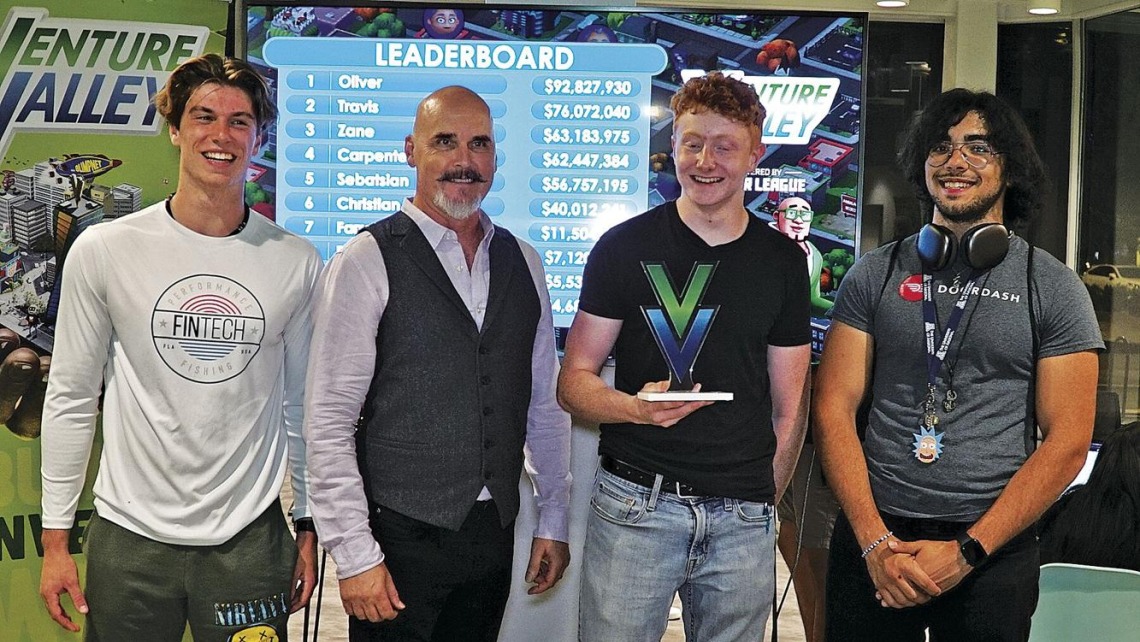UA student wins big at business game tourney

This article was originally published by Foothill News.
In a Sims-style video game, students from UA and Pima and Cochise community colleges competed to make the most revenue for their virtual businesses.
During the tourney, students played entrepreneur and put their business skills to the test. UA freshman Oliver Stoner-German walked away with the $2,500. He grew his in-game revenue to $92.8 million. The event included the UA Venture Expo showcasing student businesses, products and prototypes.
Travis Gramm won the $1,000 second prize by building businesses worth $76 million, and Zane Aljazzazi won the $500 third place. Twelve other students won part of the total $5,000 in cash giveaways and prizes.
University of Arizona FORGE partnered with Venture Valley, a fast-paced multiplayer business simulation game from the nonprofit Singleton Foundation for Financial Literacy and Entrepreneurship, for the recent tourney at Roy Place.
“We had almost a hundred competitors,” said Erika Mitnik, manager for University of Arizona Marketing & Communications, FORGE. “The winner racked up about $92 million (revenue for his simulated business).”
Added Paul Valdez, FORGE Student Venture Pathways program manager, in a statement, “As part of our quest to bring entrepreneurship opportunities to our students, we partnered with the Venture Valley mobile and PC game, as it encompasses what we teach on a daily basis.
“All of our students had a blast playing the game and walked away from the competition with a real sense of all of the factors and intricacies involved in being an entrepreneur.”
Mitnik said Stoner-German, who is studying pre-business and is looking to go into the Eller program, told her the video game gave him the chance to test his economics studies.
“I signed up for it (after hearing about the tournament at a club fair),” Stoner-German said. “Afterward, I got more involved in the FORGE organization and I’m looking further to get more involved in that.”
Nick Night, Venture Valley game maker, started the simulated business video game about four years ago through the Singleton Foundation for Financial Literacy and Entrepreneurship.
“We wanted to take finance education and make it fun and engaging (for business/entrepreneurship education),” Night said. “How do you make it not just about education? Something that people want to play and have fun but secretly learn something.”
Night said the video game simulates how to build or model your business in a fast-paced multiplayer game. Venture Valley is a free (no in-app purchases or ads) PC and mobile (iOS and Android) game.
The game has card play events, both good and bad, and real-life situations that are “a bit cartoonish,” Night added. He equated it to having a coffee shop business and then a new coffee shop moves in across the street with less expensive drinks.
“And how do you handle that,” he said. “Maybe make your coffee gourmet or you have espresso for sale, you sell more espresso.”
Night said as players build their businesses, they have to figure in costs for running it—such as research and development and marketing. They have to be prepared for emergencies, too, like plumbing problems or storms that flood the building.
FORGE (Finding Opportunities and Resources to Grow Entrepreneurs) is an entrepreneurial community that combines startup acceleration alongside experiential student and community education. FORGE programs provide entrepreneurial education, mentoring, coaching, exposure to the venturing process, and readiness assessment tools. FORGE maintains an entrepreneurial resource hub in Downtown Tucson (Roy Place) and several locations on the UA campus and throughout the state.
Asked about his plans for his winnings, the 19-year-old Stoner-German will handle his prize money wisely.
“I will probably invest it into the market and grow more money and use that to fund my college education,” he said. “Put it in my portfolio, I have a stock market portfolio.”
Stoner-German said he was determined to win the tournament, which ran from 2 to 9 p.m. Students/participants were welcome to start their games any time during those hours.
“We got to do a bunch of tries at the game and we had 15 minutes for every single try … to create the business and create as much revenue as we could for said business,” he said. “I was there for about seven hours playing. … I was there for the whole entire tournament. … I was there to win it.
“We got to choose from three business options. We had options for floral, pizza and hovercraft. I focused basically fully on the hovercraft one because it made the most money and seemed really cool.”

